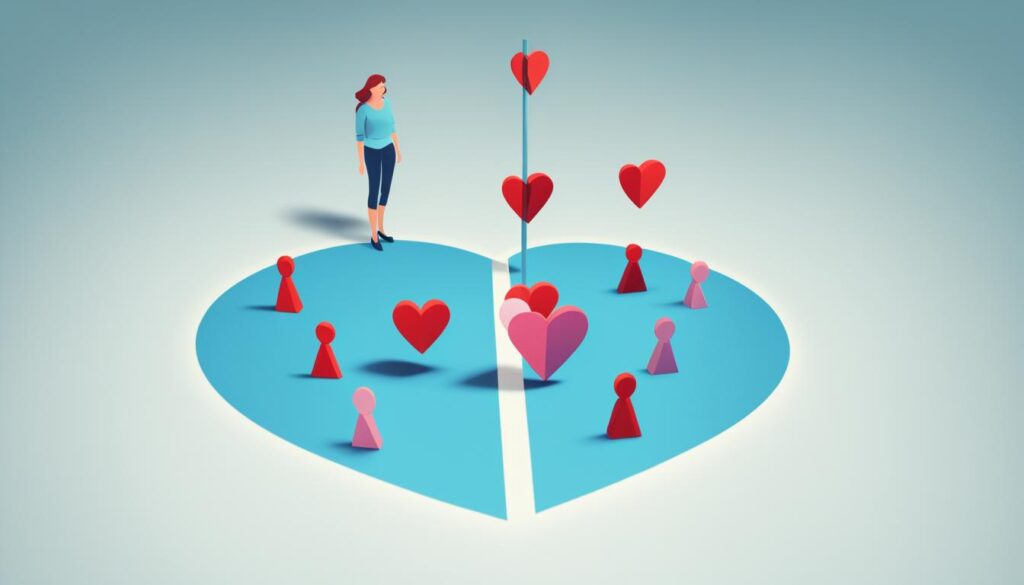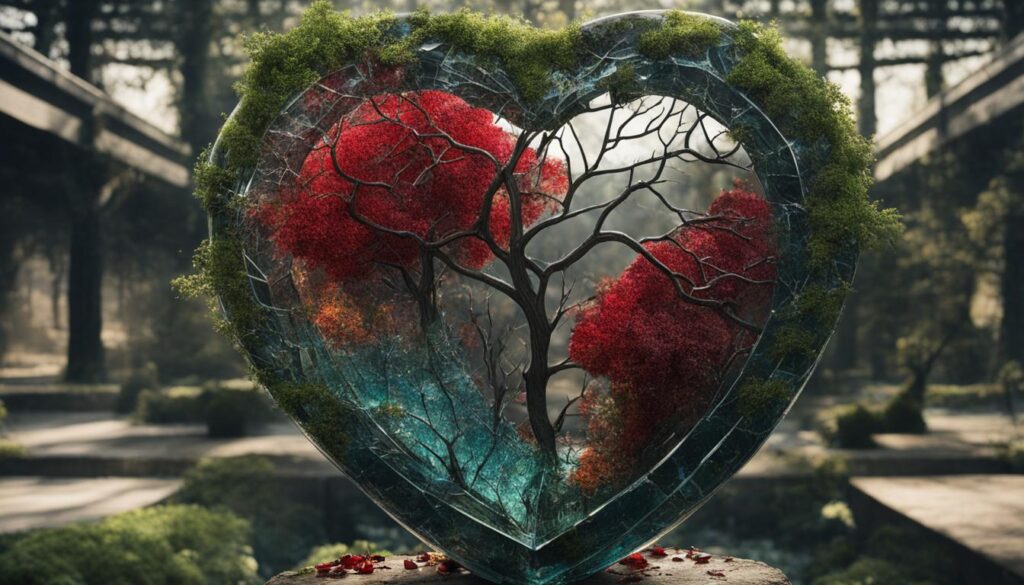Love is a beautiful and powerful emotion that can shape our lives and relationships. When we find ourselves deeply in love with someone, it can be an overwhelming experience filled with joy and happiness. However, sometimes our hearts lead us to love someone who may not be right for us. This conflict between our emotions and our rational thoughts can create a profound tension within us, leaving us questioning our choices and seeking clarity.
In Buddhism, the teachings offer wisdom that can help us navigate this complex terrain of conflicting emotions and difficult decisions. It reminds us to embrace truth, even when it is painful. As the Buddha once said, “Three things cannot be long hidden: the sun, the moon, and the truth.”
This powerful quote serves as a reminder that truth cannot be hidden forever, and by acknowledging our true feelings and the reality of our situation, we can begin to move towards a path of healing and growth. It is essential to cultivate self-awareness and recognize the signs of an unhealthy relationship, even if it means letting go of someone we deeply love.
Key Takeaways:
- Conflicting emotions can arise when we love someone deeply but know they are not right for us.
- Buddhism teaches us to embrace truth, even if it is painful.
- Self-awareness is crucial in relationships as it helps us recognize unhealthy dynamics and set boundaries.
- Letting go of someone we love is an act of self-love and self-preservation.
- Recognizing the signs of an unhealthy relationship is essential for our well-being.
Understanding the Tension of Conflicting Emotions
Sometimes, we find ourselves in a situation where we love someone deeply, but we know deep down that they are not right for us. This creates a tension within us, as our emotions clash with our rational thoughts. It’s important to recognize this conflict and navigate it with self-awareness and clarity.
Conflicting emotions can be overwhelming and confusing. On one hand, we may feel a strong emotional attachment to the person we love, experiencing moments of happiness and joy in their presence. On the other hand, we may also recognize the signs of an unhealthy relationship, such as manipulation, disrespect, or a lack of support. This internal battle between love and reason can lead to feelings of guilt, doubt, and frustration.
It’s crucial to acknowledge that it is possible to love someone and still acknowledge that they are not right for us. Love can be complex, and it doesn’t always guarantee a healthy and fulfilling relationship. By recognizing the conflicting emotions we experience, we can begin to understand the discrepancy between our heart and our mind.
This recognition is the first step towards moving on from a toxic relationship or an unhealthy dynamic. It signifies a level of self-awareness that enables us to prioritize our own well-being and happiness. It requires us to confront our emotions honestly and make decisions based on what is truly best for us in the long run.
Remember, recognizing the tension of conflicting emotions is not a sign of weakness, but rather a demonstration of strength and self-respect. It takes courage to acknowledge the truth and take steps towards a healthier future.

When confronted with conflicting emotions, it can be helpful to seek support from trusted friends, family, or professionals. They can provide guidance, lend an empathetic ear, and offer valuable insights as you navigate your journey towards healing and growth.
Recognizing Unhealthy Patterns
One of the key aspects of understanding conflicting emotions in a relationship is recognizing unhealthy patterns. These patterns can include emotional manipulation, gaslighting, disregard for boundaries, constant criticism, or any form of abuse.
By acknowledging these red flags, we become better equipped to make informed decisions about our relationships. We can distinguish between the challenges and conflicts that are inherent in any relationship and the toxic dynamics that are detrimental to our well-being.
Recognizing unhealthy patterns is an empowering act that allows us to break free from toxic relationships. It grants us the opportunity to create space for healthier connections and opens the door to a future filled with love, respect, and personal growth.
The Importance of Self-Awareness in Relationships
Self-awareness is a powerful tool that can greatly impact our relationships. When we are self-aware, we have a deeper understanding of our own needs, desires, and boundaries. We recognize the patterns and behaviors we bring into relationships, allowing us to navigate them with clarity and intention.
In the journey of love, emotional attachment is natural and often strong. It can blind us to the unhealthy dynamics that may be present in our relationships. However, by cultivating self-awareness, we can better recognize when a relationship is veering into unhealthy territory.
Recognizing unhealthy relationships is essential for our well-being and growth. It takes courage to acknowledge the signs of emotional abuse, manipulation, and lack of respect. Being self-aware allows us to step back and evaluate whether the love we feel for someone is enough to overcome the toxicity that may be present.
Letting go of someone you love is never easy, but it can be necessary for your own happiness and mental health. Self-awareness empowers you to make decisions that align with your well-being, even if it means saying goodbye to someone you still love.
It’s important to remember that letting go is an act of self-love and self-preservation. You deserve a relationship that respects and uplifts you. By letting go of an unhealthy relationship, you create space for healing and open doors for healthier connections in the future.
Self-awareness in relationships is a journey that requires introspection and vulnerability. It allows you to recognize when a relationship may not be serving your best interests and gives you the strength to let go and pursue a brighter future.
Take a moment for self-reflection:
- Reflect on your own needs, desires, and boundaries in a relationship.
- Consider any patterns or behaviors that may be detrimental to your well-being.
- Evaluate whether your current relationship aligns with your values and brings you joy.
- Be honest with yourself about any signs of emotional abuse or manipulation.
- Remember that letting go of someone you love can be an act of self-love and empowerment.
Signs of an Unhealthy Relationship
| Signs of an Unhealthy Relationship | Explanation |
|---|---|
| Emotional abuse | Includes insults, belittling, controlling behavior, and manipulation that erode your self-esteem. |
| Lack of respect | When your partner consistently disregards your feelings, boundaries, and autonomy. |
| Disregard for boundaries | Your partner consistently crosses your boundaries and fails to respect your limits and needs. |
| Manipulation | Includes tactics such as guilt-tripping, gaslighting, or using emotional leverage to control your actions. |

Letting Go of Someone You Love
Letting go of someone we love can be one of the most challenging experiences in life. It takes tremendous strength and courage to recognize when a relationship is unhealthy and must be released. While it may feel daunting, the act of letting go is actually an act of self-love and self-preservation.
Recognizing signs of an unhealthy relationship is the first step towards letting go. It’s important to assess the dynamics and evaluate if they are detrimental to your well-being. Are there patterns of emotional abuse, manipulation, disrespect, or disregard for your boundaries? It’s crucial to pay attention to these red flags and acknowledge when a relationship is toxic.
Confronting your emotions is an essential part of the process. Give yourself permission to grieve the loss of the relationship. Allow yourself to feel the pain, sadness, and heartbreak that comes with letting go. It’s natural to experience a range of emotions, and it’s vital to give yourself the space and time to heal.
Coping with heartbreak requires self-care and self-compassion. Take care of your physical, mental, and emotional well-being. Engage in activities that bring you joy and fulfillment. Surround yourself with a supportive network of friends and family who can offer guidance, love, and understanding during this challenging time.
Remember, letting go is not a sign of weakness; it’s a symbol of strength. It’s an act of prioritizing your own happiness and growth. By releasing a toxic relationship, you create space for healthier connections and a brighter future. Trust in your ability to heal and trust that new opportunities for love and happiness will come your way.
| Key Steps for Letting Go | Benefits of Letting Go | Supportive Practices |
|---|---|---|
| 1. Recognize the signs of an unhealthy relationship. | – Emotional freedom and peace of mind – Improved self-esteem and self-worth | – Seeking therapy or counseling – Practicing mindfulness and meditation |
| 2. Confront and process your emotions. | – Emotional healing and growth – Opening yourself up to new possibilities | – Journaling and self-reflection – Engaging in creative outlets |
| 3. Practice self-care and self-compassion. | – Increased self-love and self-awareness – Restoring balance and well-being | – Engaging in physical exercise – Nurturing your passions and hobbies |
| 4. Surround yourself with a supportive network. | – Emotional support and understanding – Strengthened bonds with loved ones | – Connecting with friends and family – Joining support groups or communities |
Recognizing Unhealthy Relationships
Recognizing the signs of an unhealthy relationship is an essential step in moving on from a toxic relationship and fostering self-awareness in relationships. By being able to identify these signs, you can protect yourself from emotional abuse, manipulation, and other harmful behaviors that can hinder your personal growth and happiness.
Signs of an Unhealthy Relationship
Here are some common signs that indicate an unhealthy relationship:
- Emotional abuse: This includes constant criticism, belittling, or humiliation, which can cause long-term emotional damage.
- Manipulation: Manipulative behavior involves controlling actions, decisions, and opinions, leaving you feeling trapped and powerless.
- Lack of respect: Mutual respect is a cornerstone of a healthy relationship. If there is a consistent disregard for your feelings, boundaries, and autonomy, it’s a clear indication of an unhealthy dynamic.
- Disregard for boundaries: Healthy relationships should have clear boundaries that are respected by both parties. If your partner consistently violates your boundaries, it’s a sign of an unhealthy relationship.
Recognizing these signs requires self-awareness and the willingness to confront the reality of your relationship. It can be challenging, especially when you still have feelings for the person, but acknowledging these patterns is a crucial step towards regaining your emotional well-being and finding healthier connections.

| Signs of an Unhealthy Relationship | Impact |
|---|---|
| Emotional abuse | Causes long-term emotional damage and low self-esteem. |
| Manipulation | Leaves you feeling trapped and powerless. |
| Lack of respect | Erodes trust and leads to feelings of worthlessness. |
| Disregard for boundaries | Undermines your autonomy and sense of self. |
Recognizing these signs of an unhealthy relationship empowers you to take control of your own well-being. It allows you to make informed decisions about your future and move towards healthier, more fulfilling connections. Remember, your happiness and mental health should always be a priority.
Navigating the Path to Healing and Growth
After leaving a toxic relationship, the journey towards healing and growth begins. This process requires seeking support from loved ones, practicing self-care, and engaging in fulfilling activities. It’s a time for self-discovery, letting go of someone you love, and learning to embrace love and happiness on healthier terms.
Finding Support
Surrounding yourself with a strong support system is crucial during this challenging time. Reach out to trusted friends and family members who can offer a listening ear, understanding, and advice. Consider seeking professional help from therapists or counselors who specialize in relationships and healing from heartbreak. Remember, you don’t have to go through this alone.
Self-Care and Self-Reflection
Practicing self-care is vital for your emotional well-being. Take time to nurture yourself by engaging in activities you enjoy, such as exercising, practicing mindfulness or meditation, journaling, or pursuing hobbies. This is also a time for self-reflection, where you can explore your own needs, desires, and boundaries. Reflect upon the lessons learned from the toxic relationship and use them as stepping stones towards personal growth.
Letting Go and Moving On
Letting go of someone you love is never easy, but it’s necessary for your own growth and happiness. Accept that the relationship was toxic and remind yourself of the reasons why it was not right for you. Give yourself permission to grieve the loss of the relationship, acknowledging the pain and allowing yourself to heal. Understand that letting go does not mean forgetting or devaluing what you shared, but rather creating space for new love and positive experiences in your life.
Remember, coping with heartbreak takes time, so be patient with yourself. Celebrate small victories along the way and focus on your personal growth. By navigating this path to healing and growth, you will emerge stronger, wiser, and ready to embrace healthier relationships in the future.

| Benefits of Navigating the Path to Healing and Growth | Actions to Take |
|---|---|
| Improved emotional well-being | Seeking support from loved ones |
| Increased self-awareness | Practicing self-care and self-reflection |
| Positive outlook on future relationships | Letting go and moving on |
| Rediscovery of personal identity | Allowing yourself to heal |
| Embracing healthier connections | Focusing on personal growth |
Conclusion
Embracing the truth that you love someone but they are not right for you can be one of the most difficult and painful realizations. However, it is an essential step towards finding true happiness and fulfillment in your life. By acknowledging this truth, you are taking a powerful step towards your own self-growth and emotional well-being.
Moving on from a toxic relationship requires self-awareness and courage. It means recognizing the signs of an unhealthy relationship and understanding that you deserve better. It is important to prioritize your own needs and happiness, even if it means letting go of someone you deeply care about.
Self-awareness plays a crucial role in relationships. By being attuned to your own emotions, desires, and boundaries, you can navigate relationships with clarity and integrity. Recognizing unhealthy dynamics and addressing them early on can save you from prolonged pain and heartache.
As you embark on this journey of healing and growth, remember that you are not alone. Seek support from loved ones, friends, or professionals who understand and empathize with your experiences. Take care of yourself, practice self-care, and engage in activities that bring you joy and fulfillment. Believe that you are deserving of a healthy, loving relationship, and trust that brighter days are ahead.
FAQ
What should I do if I love someone but I know they’re not right for me?
It’s important to recognize and accept that even though you love someone, they may not be the best partner for you. It’s crucial to prioritize your own happiness and well-being. Consider seeking support from friends and family and taking steps towards letting go and finding healthier connections.
How can I navigate conflicting emotions in a relationship?
Conflicting emotions in a relationship can be challenging to navigate. It’s important to be self-aware and recognize when a relationship is unhealthy. Take time to reflect on your own needs, desires, and boundaries. Seek clarity and prioritize your own well-being when making decisions about the future of the relationship.
Why is self-awareness important in relationships?
Self-awareness is crucial in relationships because it helps us recognize our own patterns and behaviors. By understanding ourselves better, we can identify when a relationship is unhealthy and when we need to let go. Self-awareness also allows us to establish and maintain healthy boundaries and prioritizes our own needs and happiness.
How do I let go of someone I love?
Letting go of someone you love can be incredibly difficult but necessary for your own growth and happiness. It’s important to give yourself time and space to grieve the loss and process your emotions. Seek support from friends, family, or professionals. Engage in self-care activities and focus on personal growth. Remember that letting go is an act of self-love and self-preservation.
What are the signs of an unhealthy relationship?
Signs of an unhealthy relationship include patterns of emotional abuse, manipulation, lack of respect, and disregard for boundaries. It’s crucial to recognize these signs and take steps towards breaking free from unhealthy dynamics. Prioritize your well-being and seek healthier connections.
How can I heal and grow after leaving a toxic relationship?
Healing and growth after leaving a toxic relationship is a journey that requires self-care, support, and self-discovery. Seek professional help if needed. Surround yourself with friends and family who uplift and support you. Engage in activities that bring joy and fulfillment. Focus on personal growth and learning to embrace love and happiness on healthier terms.
How can I embrace the truth that I love someone but they’re not right for me?
Embracing the truth that you love someone but they’re not right for you can be challenging but necessary for your own happiness and fulfillment. Be self-aware and recognize when a relationship is unhealthy. Take steps towards letting go, seeking support, and prioritizing your own well-being. Remember that you deserve love, happiness, and harmony in your relationships.

